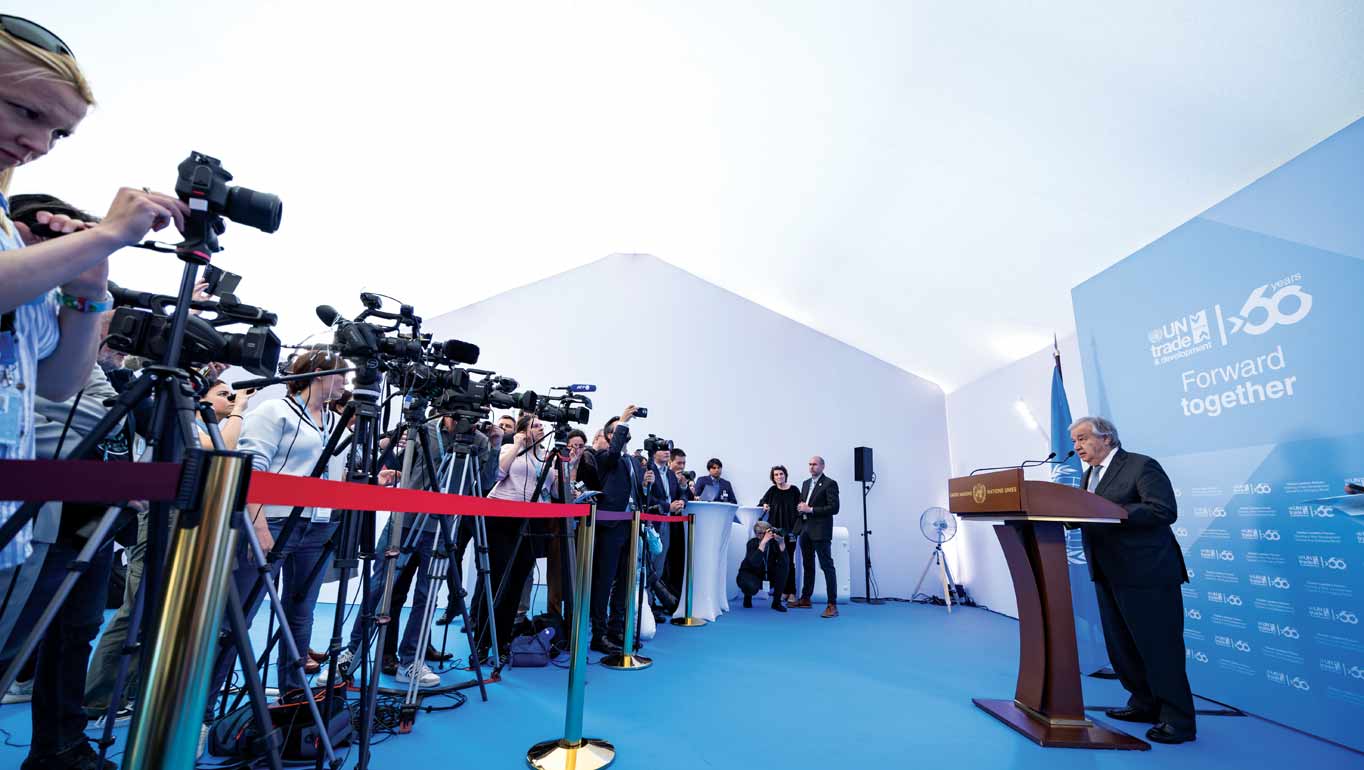Sixty years ago, amid the post-war landscape and evolving global trade complexities, the UN Conference on Trade and Development (UNCTAD) was established in Geneva. It was born from a vision to challenge an inequitable global economy and to promise a future where newly independent nations could claim their rightful recognition and a fair share of globalization’s benefits.
Navigating recent challenges
Under new leadership, UNCTAD has streamlined its operations and intensified its advocacy for developing economies in recent years, focusing on inclusive and sustainable development.
This renewed drive prepared the organization to understand and analyze the impacts of unprecedented global crises such as the COVID-19 pandemic, the Russian invasion of Ukraine, and conflicts in the Middle East. These crises, alongside severe impacts from climate change and shifting trade and financial landscapes, have tested the organization’s adaptability.
A new multilateralism
In response to these challenges, today’s world demands a renewed commitment to multilateralism. The traditional rules-based economic order is under significant strain as a multipolar world emerges, characterized by multiple powerful nations. This environment could lead to fragmentation and trade wars, potentially sidelining the voices of developing countries.
Against this backdrop, UN Secretary-General António Guterres emphasized the urgent need to “reform or rupture.” During the official 60th anniversary celebrations in Geneva, he highlighted UNCTAD’s relevance, underscoring the importance of multilateralism in global governance, trade, and finance. Mr. Guterres called for leveraging the spirit of its founders to reimagine trade as a force for shared prosperity, not geopolitical rivalry.

UN Trade and Development
Marking its anniversary this year, the organization is not only reflecting on past achievements but also rebranding to better meet future needs. This rebranding to ‘UN Trade and Development’ underscores its renewed commitment to shaping a more equitable and sustainable global economic landscape. It signals a call to action for all stakeholders to join in fostering a more inclusive global economy.
Championing global governance reforms
The current multiple global crises highlight the urgent need to address the imbalances and tensions within societies and global multilateral systems. These crises stem from a global pandemic, widening inequalities, increasing geopolitical tensions, and the existential threat of climate change.
In today’s volatile geopolitical climate, UN Trade and Development’s role is becoming increasingly important. Echoing this sentiment, Secretary-General Rebeca Grynspan repeatedly stressed the necessity of evolving global structures to correctly reflect the realities of a multipolar world, for example at this year’s G20 discussions.
Under her leadership, the organization establishes itself as a key advocate for global governance systems that are inclusive, fair, and effective, emphasizing the need for greater representation of developing countries in global decision-making processes.
UN Trade and Development has called for comprehensive and immediate efforts to address the systematic barriers in the international financial architecture, including the reform of the G20’s Common Framework on debt restructuring and relief.
The organization also contributes to ongoing efforts led by the UN Secretary-General’s Artificial Intelligence (AI) Advisory Body, tasked with analyzing and advancing recommendations on the ethical development and use of transformative technology. It advocates for a global framework to guide fair and responsible use of AI, emphasizing the importance of transparency, accountability, and inclusivity.
Addressing key challenges
Concurrently, global public debt has surged, with many countries now spending more on servicing debt than on crucial public services. In this climate, UN Trade and Development’s advocacy for robust debt management and financial architecture reforms is crucial. Its Debt Management and Financial Analysis System has enhanced the capacity of over 115 institutions in 75 countries to manage public debt effectively, proving essential for maintaining economic stability in developing nations.
The organization also leads initiatives like the Automated System for Customs Data, which has improved the efficiency of trade processes in over 100 countries. Furthermore, the organization assists these nations in aligning trade policies with environmental and climate objectives, part of a broader strategy to ensure that trade and development go together with sustainability.
These are but two examples at the center of how the organization delivers on its mission, constantly adapting to evolving challenges.
The promise of 1964 reimagined
The foundational promise of 1964 continues to guide the organization. By embracing digital transformation, championing sustainable development, advocating for inclusive trade policies, and reinforcing multilateralism, the organization aims to ensure that globalization’s benefits are equitably shared. The road ahead will require innovative approaches and a renewed commitment to cooperation and development.
Today, UN Trade and Development continues to play a vital role, reflecting the ongoing importance of its mission. With collective effort, the organization’s foundational promise can be transformed into a reality for all, continuing to shape a fairer and more prosperous global economy.



